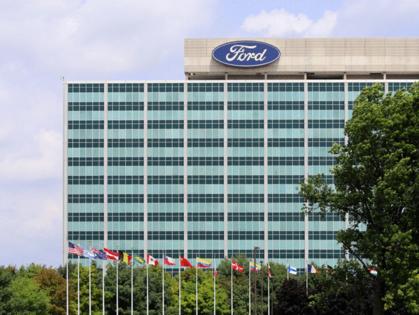Ford EV battery joint venture begins production in Kentucky, delays Tennessee plant to '27
Published in Automotive News
Ford Motor Co.'s electric vehicle battery joint venture launched production Tuesday at its first plant in Kentucky for cells that will go into F-150 Lightning pickup trucks and E-Transit commercial vans, while production at the joint venture's Tennessee battery plant has been delayed until 2027.
The production at BlueOvalSK Battery Park's Kentucky 1 plant in Glendale is a landmark date for the partnership between the Dearborn automaker and Korean battery partner SK On Ltd. in an effort to vertically integrate a key part of an EV and reduce costs.
But it comes as growth in overall EV sales in the United States has missed expectations over consumer concerns with their expense, range, charging speeds and charging infrastructure availability. It's a trajectory likely to continue with the end of a federal consumer tax credit incentive starting in October and efforts by the Trump administration to roll back and even remove greenhouse gas emissions regulations. BlueOval SK is signaling it's looking for more customers.
“We are proud to build batteries at our Kentucky 1 facility that will power next-generation electric vehicles,” BlueOval SK CEO Michael Adams said in a statement. “The start of production is a significant milestone that strengthens our position in the electric vehicle battery market.”
Ford EV sales were down almost 10% year-over-year through July. Mustang Mach-E SUV sales were up 1%, while Lightning and E-Transit were down 14% and 40%, respectively.
Ford last year lost $5.1 billion on its Model e EV division, and before suspending its guidance for its business units because of tariffs, was forecasting at least a similar loss in 2025. Chief Financial Officer Sherry House has emphasized efforts to reduce costs for Ford's EVs for materials, parts and logistics, but batteries make up the biggest cost in the vehicle. The federal government also subsidizes U.S. production of EV batteries.
In an interview with Bloomberg, BOSK CEO Michael Adams said the company isn't only looking to do business with Ford and has a high likelihood of signing up new customers for the batteries, such as in the energy storage business.
"We are an independent company who will always position ourselves to gain new customers," BOSK spokesperson Mallory Cooke said in an email. "So we, along with our parents, are indeed always looking for new business."
The $5.8 billion Kentucky site now employs more than 1,450 people of 5,000 expected at full capacity, according to a BOSK newsletter. The start of production comes ahead of a National Labor Relations Board vote Aug. 26-27 at the plant for whether employees there wish to join the United Auto Workers; a card check system at joint-venture plants was not a part of the Ford 2023 contract, unlike agreements with General Motors Co. and Chrysler parent Stellantis NV.
The Kentucky site has two battery plants, with the second delayed. A third BOSK battery plant is a part of the BlueOval City campus in Stanton, Tennessee, where Ford also will have an EV assembly plant for its next-generation full-size electric pickup. That program has been delayed until 2028 in response to customer demand, but BOSK now says battery production there will begin in 2027.
After nixing plans last year for a three-row all-electric SUV, CEO Jim Farley said the company won't launch another EV unless it can be profitable within a year. But the company last week announced a $2 billion investment for Louisville Assembly Plant in Kentucky to build a $30,000 midsize all-electric pickup, and Chief Investment Relations Officer Lynn Tyson said it's expecting to be operating profit positive, though she declined to commit to the year-long timeframe.
That vehicle will use batteries from Ford's wholly owned battery plant in Marshall, Michigan, which is producing a different, less-expensive kind of battery called lithium-iron-phosphate — technology it's licensing from a Chinese battery manufacturer.
©2025 www.detroitnews.com. Visit at detroitnews.com. Distributed by Tribune Content Agency, LLC.








Comments